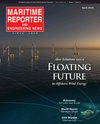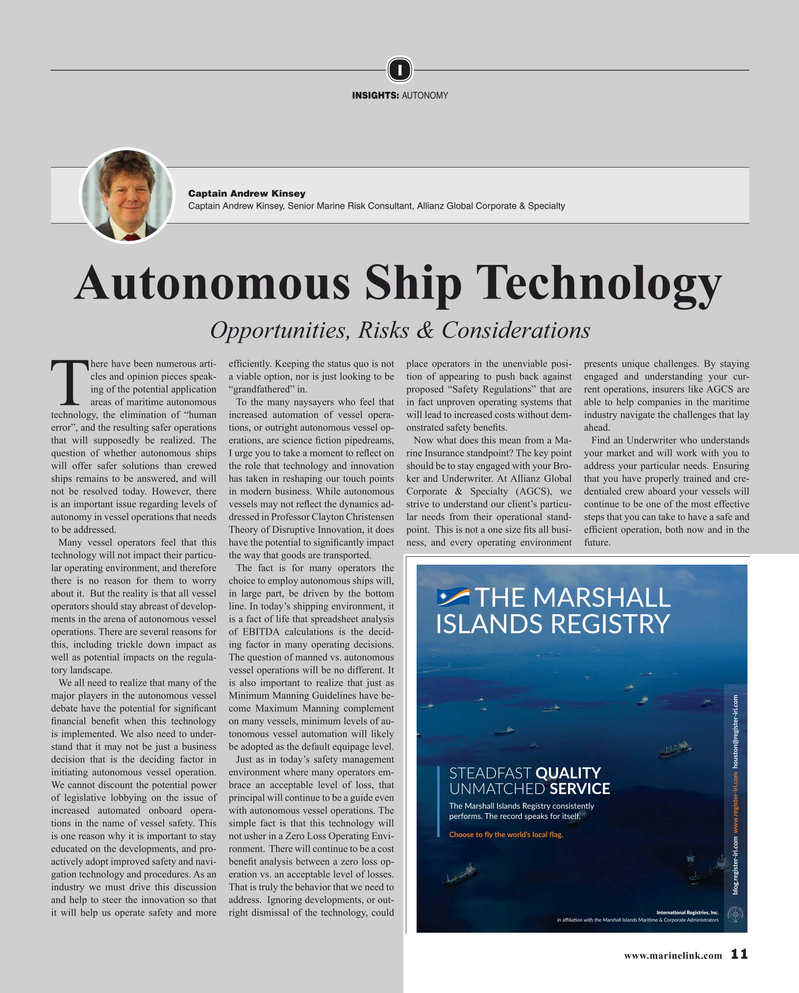
Page 11: of Maritime Reporter Magazine (April 2019)
Navies of the World
Read this page in Pdf, Flash or Html5 edition of April 2019 Maritime Reporter Magazine
I
INSIGHTS: AUTONOMY
Captain Andrew Kinsey
Captain Andrew Kinsey, Senior Marine Risk Consultant, Allianz Global Corporate & Specialty
Autonomous Ship Technology
Opportunities, Risks & Considerations here have been numerous arti- ef? ciently. Keeping the status quo is not place operators in the unenviable posi- presents unique challenges. By staying cles and opinion pieces speak- a viable option, nor is just looking to be tion of appearing to push back against engaged and understanding your cur- ing of the potential application “grandfathered” in. proposed “Safety Regulations” that are rent operations, insurers like AGCS are
Tareas of maritime autonomous To the many naysayers who feel that in fact unproven operating systems that able to help companies in the maritime technology, the elimination of “human increased automation of vessel opera- will lead to increased costs without dem- industry navigate the challenges that lay error”, and the resulting safer operations tions, or outright autonomous vessel op- onstrated safety bene? ts. ahead. that will supposedly be realized. The erations, are science ? ction pipedreams, Now what does this mean from a Ma- Find an Underwriter who understands question of whether autonomous ships I urge you to take a moment to re? ect on rine Insurance standpoint? The key point your market and will work with you to will offer safer solutions than crewed the role that technology and innovation should be to stay engaged with your Bro- address your particular needs. Ensuring ships remains to be answered, and will has taken in reshaping our touch points ker and Underwriter. At Allianz Global that you have properly trained and cre- not be resolved today. However, there in modern business. While autonomous Corporate & Specialty (AGCS), we dentialed crew aboard your vessels will is an important issue regarding levels of vessels may not re? ect the dynamics ad- strive to understand our client’s particu- continue to be one of the most effective autonomy in vessel operations that needs dressed in Professor Clayton Christensen lar needs from their operational stand- steps that you can take to have a safe and to be addressed. Theory of Disruptive Innovation, it does point. This is not a one size ? ts all busi- ef? cient operation, both now and in the
Many vessel operators feel that this have the potential to signi? cantly impact ness, and every operating environment future. technology will not impact their particu- the way that goods are transported. lar operating environment, and therefore The fact is for many operators the there is no reason for them to worry choice to employ autonomous ships will, about it. But the reality is that all vessel in large part, be driven by the bottom operators should stay abreast of develop- line. In today’s shipping environment, it ments in the arena of autonomous vessel is a fact of life that spreadsheet analysis operations. There are several reasons for of EBITDA calculations is the decid- this, including trickle down impact as ing factor in many operating decisions. well as potential impacts on the regula- The question of manned vs. autonomous tory landscape. vessel operations will be no different. It
We all need to realize that many of the is also important to realize that just as major players in the autonomous vessel Minimum Manning Guidelines have be- debate have the potential for signi? cant come Maximum Manning complement ? nancial bene? t when this technology on many vessels, minimum levels of au- is implemented. We also need to under- tonomous vessel automation will likely stand that it may not be just a business be adopted as the default equipage level. decision that is the deciding factor in Just as in today’s safety management initiating autonomous vessel operation. environment where many operators em-
STEADFAST QUALITY
We cannot discount the potential power brace an acceptable level of loss, that
UNMATCHED SERVICE of legislative lobbying on the issue of principal will continue to be a guide even $_;-uv_-??v?-m7v!;]bv|u?1omvbv|;m|?? increased automated onboard opera- with autonomous vessel operations. The r;u=oulvl$_;u;1ou7vr;-hv=oub|v;?=l tions in the name of vessel safety. This simple fact is that this technology will _oov;|oY?|_;?ou?7Lv?o1-?Y-]l is one reason why it is important to stay not usher in a Zero Loss Operating Envi- educated on the developments, and pro- ronment. There will continue to be a cost actively adopt improved safety and navi- bene? t analysis between a zero loss op- gation technology and procedures. As an eration vs. an acceptable level of losses. industry we must drive this discussion That is truly the behavior that we need to blog.register-iri.com www.register-iri.com [email protected] and help to steer the innovation so that address. Ignoring developments, or out- m|;um-?om-?!;]bv|ub;vkm1l it will help us operate safety and more right dismissal of the technology, could bm-L?b-?om?b|_|_;-uv_-??v?-m7v-ub?l;sourou-|;7lbmbv|u-|ouv www.marinelink.com 11
MR #4 (10-17).indd 11 4/2/2019 4:01:12 PM

 10
10

 12
12
